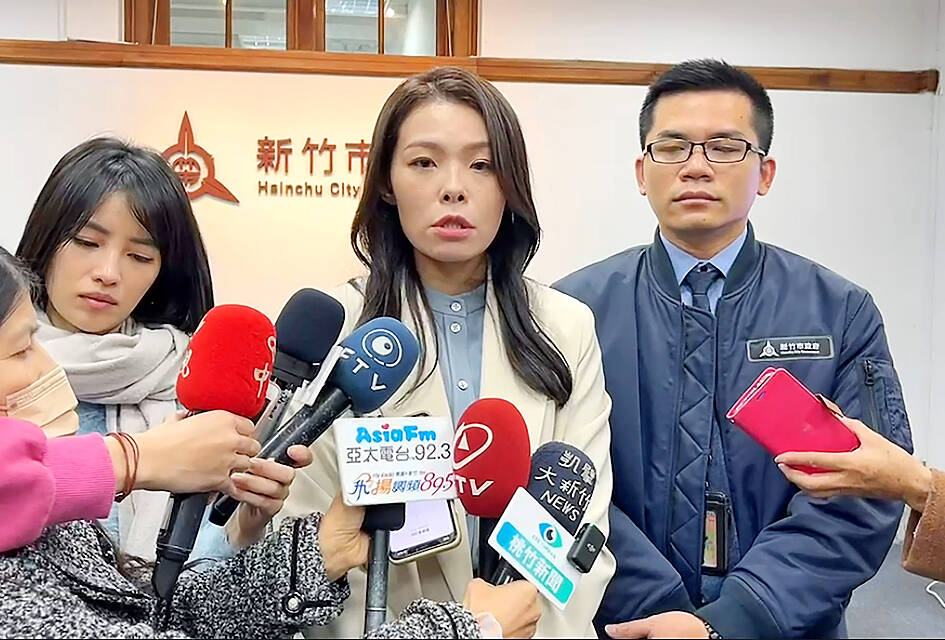An anonymous person has launched a campaign on the Threads social media platform to recall Hsinchu Mayor Ann Kao (高虹安).
Calling on people to take part in the first stage of the recall, which involves collecting signatures, the campaign initiator says Hsu is unfit for the post, listing issues such as an apartment complex fire in the city on May 26, and allegations that she allowed her boyfriend to exert undue influence in city affairs.
Kao has been charged with corruption, with a ruling expected on July 24.

Photo: CNA
Kao ranked second to last among 13 mayors in a policy satisfaction survey conducted by Global Views Monthly this year. The survey excluded mayors from the six special municipalities.
Keelung Mayor George Hsieh (謝國樑) ranked last, and civic groups have launched a recall campaign against him.
The Hsinchu City Government yesterday said that it respects the netizen’s political remarks and each citizen’s free will to express their personal opinion.
A recent media poll found that 60 percent of Hsinchu residents are in favor of Kao’s administration, although that indicates that more effort is needed from Kao’s team to win over the remaining 40 percent, the city government said.
It added that it would pursue tangible policies to improve Hsinchu residents’ welfare.
The Hsinchu Election Commission said it has not yet received a recall proposal from the petitioner.
In the first stage of a recall campaign, a proposal requires signatures from at least 1 percent of the constituency to be approved, while the second stage requires signatures from at least 10 percent of the constituency, the commission said.
The constituency votes in the third stage, and a recall is only passed if the number of valid “yes” ballots outnumbers the number of “no” ballots and makes up more one-fourth of all eligible voters in the electoral district, it said.

Taiwan is stepping up plans to create self-sufficient supply chains for combat drones and increase foreign orders from the US to counter China’s numerical superiority, a defense official said on Saturday. Commenting on condition of anonymity, the official said the nation’s armed forces are in agreement with US Admiral Samuel Paparo’s assessment that Taiwan’s military must be prepared to turn the nation’s waters into a “hellscape” for the Chinese People’s Liberation Army (PLA). Paparo, the commander of the US Indo-Pacific Command, reiterated the concept during a Congressional hearing in Washington on Wednesday. He first coined the term in a security conference last

Prosecutors today declined to say who was questioned regarding alleged forgery on petitions to recall Democratic Progressive Party (DPP) legislators, after Chinese-language media earlier reported that members of the Chinese Nationalist Party (KMT) Youth League were brought in for questioning. The Ministry of Justice Investigation Bureau confirmed that two people had been questioned, but did not disclose any further information about the ongoing investigation. KMT Youth League members Lee Hsiao-liang (李孝亮) and Liu Szu-yin (劉思吟) — who are leading the effort to recall DPP caucus chief executive Rosalia Wu (吳思瑤) and Legislator Wu Pei-yi (吳沛憶) — both posted on Facebook saying: “I

Sung Chien-liang (宋建樑), who led efforts to recall Democratic Progressive Party (DPP) Legislator Lee Kun-cheng (李坤城), was released on bail of NT$80,000 today amid outcry over his decision to wear a Nazi armband to questioning the night before. Sung arrived at the New Taipei District Prosecutors’ Office for questioning in a recall petition forgery case last night wearing a red armband bearing a swastika, carrying a copy of Adolf Hitler’s Mein Kampf and giving a Nazi salute. Sung left the building at 1:15am without the armband and covering the book with his coat. Lee said today that this is a serious

The Ministry of Economic Affairs has fined Taobao NT$1.2 million (US$36,912) for advertisements that exceed its approved business scope, requiring the Chinese e-commerce platform to make corrections in the first half of this year or its license may be revoked. Lawmakers have called for stricter enforcement of Chinese e-commerce platforms and measures to prevent China from laundering its goods through Taiwan in response to US President Donald Trump’s heavy tariffs on China. The Legislative Yuan’s Finance Committee met today to discuss policies to prevent China from dumping goods in Taiwan, inviting government agencies to report. Democratic Progressive Party Legislator Kuo Kuo-wen (郭國文) said